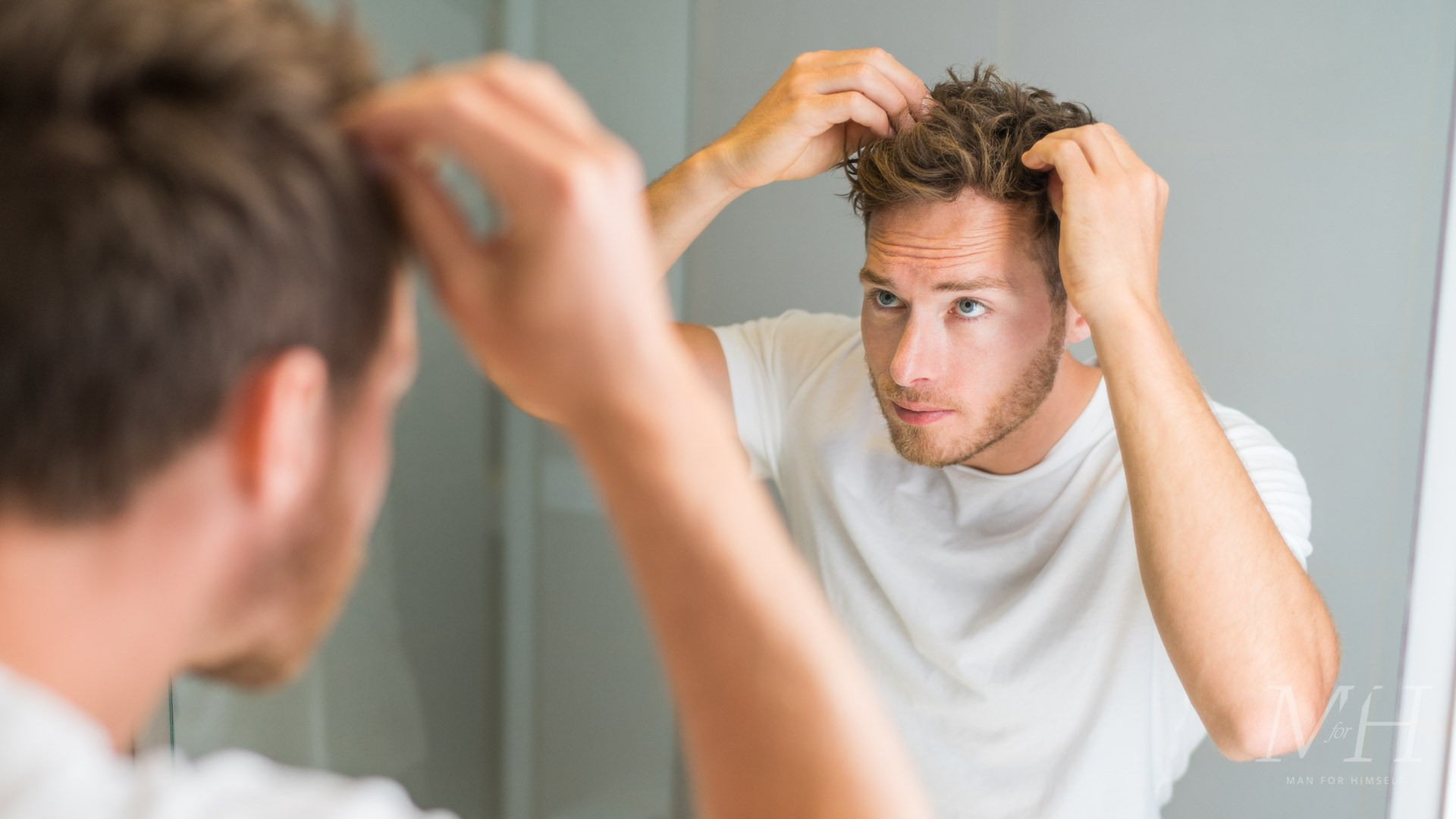How to get thicker hair: 10 tips for men
Are your hair thinner than before?
You're not alone: hair loss (especially androgenic alopecia or male pattern baldness) is incredibly common among men. Typically, baldness affects around 50% of men over the age of 50 and can result in varying degrees of hair loss, from shedding a few hairs to a bald patch on your scalp.
Other conditions can also lead to hair loss, including prolonged stress, sudden weight loss, or illness. Fortunately, there are various solutions available: over-the-counter treatments, surgery, nutrient-rich foods, supplements, and more.
We've compiled a list of 10 tips to help make your hair thicker, so you can find the solution that works best for you.
How to make hair thicker?
Be careful when styling your hair
If your hair is thinner than usual, style it carefully: a gentle approach can help prevent hair loss. For the best results, keep these tips in mind:
- Avoid pulling your hair while combing or applying products, especially when your hair is wet.
- Use a wide-tooth comb (especially on damp hair), as a fine-tooth comb can pull hair.
- Try a new haircut that suits your thinning hair to make it easier to achieve the look you want. Your hairstylist should be able to recommend a flattering style.
- Reduce the time you spend blow-drying your hair, and use a low heat setting to prevent hair from becoming too dry.
- Minimize the time spent wearing your hair in tight styles, like ponytails or braids, as they can place unnecessary strain on the hair and follicles.
Changing your styling and grooming habits may take time, but in the long term, it can improve your hair's health and appearance.
Quit smoking for thicker hair (and a healthier lifestyle)
Everyone knows smoking is extremely unhealthy. But if you're wondering how to thicken your hair, quitting the habit may give you positive results.
Why? Researchers have found a link between smoking and hair loss. It's also been shown that smoking increases the risk of graying hair before the age of 30, so not smoking can help preserve your hair and maintain its natural color longer.
Quitting smoking can also increase lung capacity by up to 10% in 9 months, improve your immune system, and reduce stress levels (according to NHS).
Wash your hair less often
After washing, your hair might look, feel, and smell fantastic, but you probably don’t need to wash it every day. Two or three times a week should be sufficient to effectively cleanse your hair and scalp.
Use a gentle shampoo designed to moisturize and nourish your hair to avoid drying it out. Also, condition your hair after shampooing to fortify it with a protective layer. This can help reduce the risk of breakage and damage.
Washing your hair won’t cause hair loss by itself, but you can help make it stronger and healthier by using a gentler approach.
Be cautious with home treatments
Do you like to bleach or dye your hair at home? You might be worsening your hair loss. Dyeing and heat styling can weaken hair and cause more shedding than usual.
However, if you don’t want to give up coloring or heated styling tools because the results boost your confidence, consult with your stylist. They may recommend alternative treatments that give you the desired look with less harmful chemicals and thermal tools.
Visit your doctor for professional advice
When discussing how to make your hair thicker, a visit to the doctor could be the first step toward a solution. They can refer you to a trichologist who treats scalp and hair conditions.
A trichologist can determine the causes of hair loss, such as scalp infections or genetic conditions, after conducting a thorough examination. They can also provide advice on how to get thicker hair and help find suitable products or medications.
Consider medications (if necessary)
You can try different medications designed to treat hair loss, including those for male pattern baldness (like minoxidil or Rogaine) that can be purchased over the counter.
Minoxidil can stop hair thinning and promote regrowth within several months. Various products contain minoxidil, including topical foams, liquids, and shampoos. You’ll need to apply them to your scalp twice a day, as consistency is essential for achieving and maintaining results. It may take at least six months for hair to start regrowing.
Alternatively, your doctor might prescribe finasteride, an oral medication available as Propecia. Like minoxidil, finasteride can prevent further hair thinning and promote new growth. However, it needs to be continued to maintain the results.
Before trying these, consult with your doctor or dermatologist about the treatment. Understand the possible side effects and risks for your peace of mind.
Get more essential nutrients
Poor nutrition can play a major role in your hair loss. If your diet lacks essential nutrients, such as vitamins, minerals, and proteins, your body won’t have what it needs to maintain healthy hair growth.
Iron and zinc are two essential minerals responsible for hair growth, but if you’re vegetarian or vegan, or have drastically reduced your calorie intake, you may be consuming too little. According to NHS, the recommended daily iron intake for men over 18 is 8.7 mg.
Fortunately, many foods are rich in iron. Some examples include:
- Eggs
- Leafy greens
- Beans
- Chickpeas
- Red meat
- Dried fruits (like apricots)
And for zinc, aim to get the recommended 9.5 mg per day with these foods:
- Legumes
- Nuts
- Seeds
- Bread
- Grains
- Dairy products
- Red meat
You may need to significantly change your diet to consume more of these foods, but if it improves your hair growth, it will be worth it. If you plan to review your diet carefully, you may want to consult with your doctor.
Consult with your doctor about supplements
Supplements can help provide the vitamins and minerals needed to maintain healthy hair, but to understand the potential side effects, consult your doctor. For example, excess zinc or iron can lead to toxicity and other issues.
Additionally, biotin (part of the B-vitamin family) has been linked to hair restoration in some cases. However, most people have healthy biotin levels and don't need to change their diet.
Also, avoid excessive intake of vitamins A, E, and selenium — too much supplementation can contribute to hair loss.
Reduce your stress levels
According to the Stress Management Society, by 2020, stress caused 74% of adults in the UK to feel “overwhelmed or unable to cope.”
Excessive stress can lead to several health problems, including telogen effluvium — a condition that causes more hair loss than usual. Fortunately, it’s typically temporary and should resolve if you can reduce your stress levels.
If you're having trouble managing stress, ask your doctor for advice. They should provide guidance on how to get thicker hair and may recommend medication.
Learn more about hair transplants
Rubenhair’s experienced surgeons have helped thousands of men undergo hair transplant surgeries.
Related: How to properly choose a hair transplant surgeon?
Improve your quality of life and schedule a consultation with our specialists, who will provide comprehensive answers to your questions and determine the best treatment course. Fill out the online form or call +371 267 777 76, and we will contact you.







